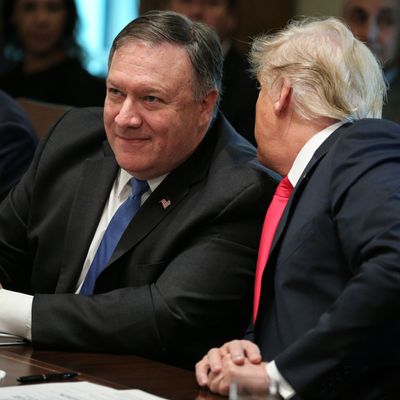
Donald Trump is mulling a plot to nullify Congress’s spending power, so as to deny $3 billion in aid to economically disadvantaged governments and peoples overseas.
Specifically, the Office of Management and Budget is planning to leave $3 billion of its $40 billion foreign aid budget unspent, unless Congress takes action to release the funds before the end of the fiscal year on September 30, according to a memo obtained by the Washington Post. Given that the House is on break until Labor Day, the Senate has a Supreme Court nomination to process, and virtually no one in either chamber wants a high-profile fight over foreign aid just before the midterm elections, congressional action appears unlikely.
It is unclear whether the administration’s gambit is even legal, as the Post explains:
The OMB’s plans would exploit a loophole in the Congressional Budget and Impoundment Control Act, which says the administration may freeze for 45 days any funding that Congress has authorized but not yet been obligated, or spent. Congress passed the Impoundment Act in 1974 as a way of pushing back against then-President Richard Nixon, who was freezing budgeted funds instead of spending them.
Normally, Congress would have to approve proposed cuts within the 45-day window for them to take effect. But the Impoundment Act does not address how to handle rescissions less than 45 days away from the end of the fiscal year.
That has led members to question the legality of the move.
“I don’t know how they can do that legally,” Corker said Thursday at a confirmation hearing for David Hale, nominee to be the under secretary of state for political affairs. “We certainly look forward to seeing how to counter that if that’s the case,” he added.
The fact that the White House is willing to take potentially extralegal measures to avoid providing $3 billion in aid to foreign governments would be remarkable in any context. But it is even more so when one considers that Donald Trump called on Congress to give him a $716 billion annual military budget earlier this year. Which is to say: He demanded that the United States spend more on “defense” next year than China, Russia, Saudi Arabia, India, France, the United Kingdom, and Japan will — combined.
It does not cost $716 billion to secure America’s airspace and coastlines from invaders, or to keep critical global trade routes open for business. There is no reason for the U.S. to outspend all other major powers combined unless it wishes to exercise hegemony on a global scale.
It’s extraordinary then, that — even as he calls for an imperial military budget — Trump remains violently committed to slashing America’s foreign aid spending, which is currently smaller, as a percentage of national GDP, than Ireland’s.
As a strategic matter, this is insane. Empires can’t live on hard power alone. In many, many circumstances targeted economic aid is a more effective tool for expanding or preserving regional influence than Tomahawk missiles. The United States tried to fortify its grip on the Middle East by toppling Saddam Hussein’s government — and wound up drastically increasing the power of its primary rival in the region. Meanwhile, the U.S. is still collecting returns on the diplomatic investments it made in Japan and Western Europe with the Marshall Plan. (Beijing, for its part, evinces a keen understanding of the vitality of soft power.)
As a political matter, however, Trump’s dissonant demands make perfect sense. The Republican Party derives much of its financing from defense contractors, and many of its votes from Americans who owe their livelihoods to the military-industrial complex. The more cash Trump can direct into Pentagon’s coffers, the happier these constituencies will be.
By contrast, the number of GOP-aligned industries and individuals who profit off of foreign aid is quite small. And the American public is infamously hostile to foreign aid (in part because it has a grossly distorted understanding of how much their government spends on it). Donald Trump played to that hostility during his 2016 campaign, while also affirming the nationalist right’s more militantly isolationist intuitions. For these reasons, slashing foreign aid — while ramping up defense spending — is a win-win for Trump: The arrangement that allows him to perform his “America First” bona fides, while keeping his party’s defense interests happy.
As a substantive matter, this approach to foreign policy is the very opposite of “America First,” as it places political convenience above the national interest. But for Trump, substance doesn’t matter.






























